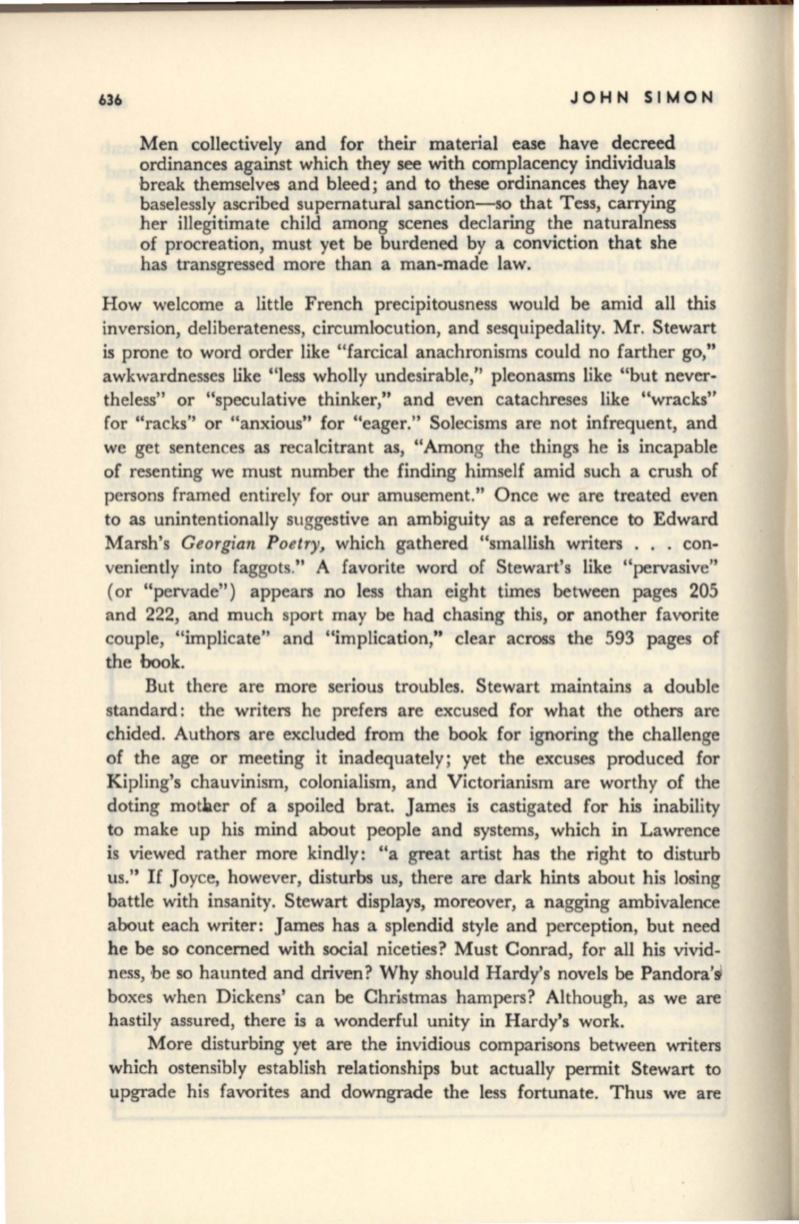

636
JOHN SIMON
Men collectively and for their material ease have decreed
ordinances against which they see with complacency individuals
break themselves and bleed; and to these ordinances they have
baselessly ascribed supernatural sanction-so that Tess, carrying
her illegitimate child among scenes declaring the naturalness
of procreation, must yet be burdened by a conviction that she
has transgressed more than a man-made law.
How welcome a little French precipitousness would be amid all this
inversion, deliberateness, circumlocution, and sesquipedality. Mr. Stewart
is prone to word order like "farcical anachronisms could no farther go,"
awkwardnesses like "less wholly undesirable," pleonasms like "but never–
theless" or "speculative thinker," and even catachreses like "wracks"
for "racks" or "anxious" for "eager." Solecisms are not infrequent, and
we get sentences as recalcitrant as, "Among the things he is incapable
of resenting we must number the finding himself amid such a crush of
persons framed entirely for our amusement." Once we are treated even
to as unintentionally suggestive an ambiguity as a reference
to
Edward
Marsh's
Georgian Poetry,
which gathered "smallish writers . . . con–
veniently into faggots." A favorite word of Stewart's like "pervasive"
(or "pervade") appears no less than eight times between pages 205
and 222, and much sport may be had chasing this, or another favorite
couple, "implicate" and "implication," clear across the 593 pages of
the book.
But there are more serious troubles. Stewart maintains a double
standard: the writers he prefers are excused for what the others are
chided. Authors are excluded from the book for ignoring the challenge
of the age or meeting it inadequately; yet the excuses produced for
Kipling's chauvinism, colonialism, and Victorianism are worthy of the
doting motliler of a spoiled brat. James is castigated for his inability
to make up his mind about people and systems, which in Lawrence
is viewed rather more kindly: "a great artist has the right to disturb
liS."
If
Joyce, however, disturbs us, there are dark hints about his losing
battle with insanity. Stewart displays, moreover, a nagging ambivalence
about each writer: James has a splendid style and perception, but need
he be so concerned with social niceties? Must Conrad, for all his vivid–
ness, be so haunted and driven? Why should Hardy's novels be Pandora',
boxes when Dickens' can be Christmas hampers? Although, as we are
hastily assured, there is a wonderful unity in Hardy's work.
More disturbing yet are the invidious comparisons between writers
which ostensibly establish relationships but actually permit Stewart to
upgrade his favorites and downgrade the less fortunate. Thus we are









